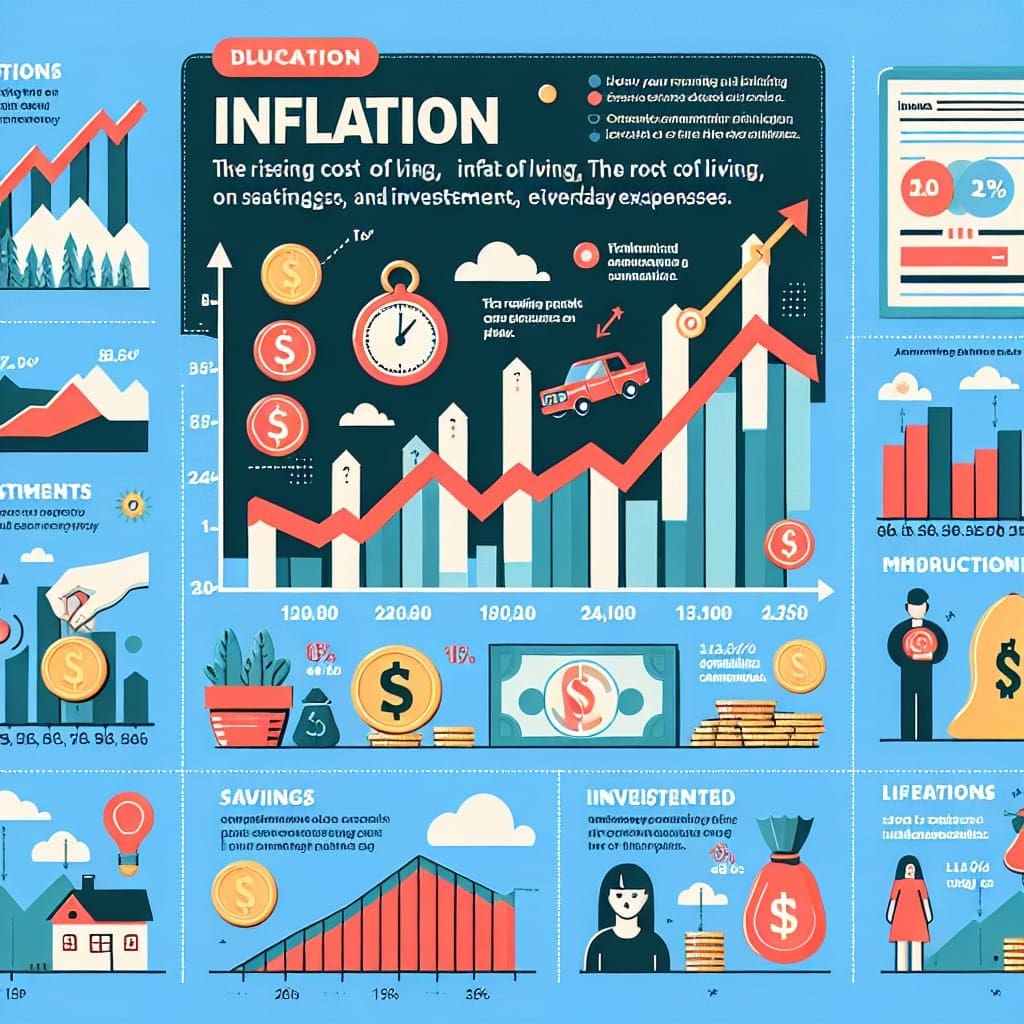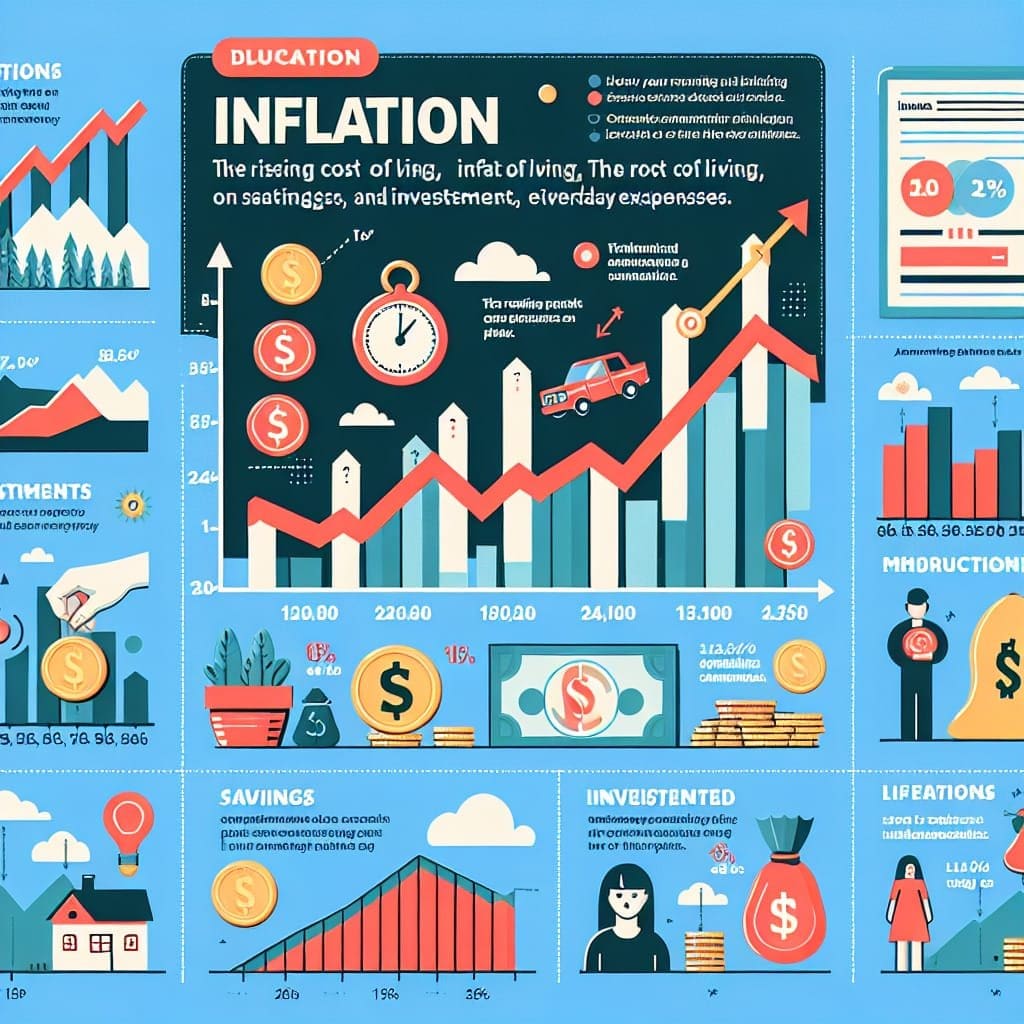Are you finding it increasingly challenging to keep up with the rising cost of living? Inflation can have a significant impact on your finances, making it essential to adjust your budget accordingly. In this article, you'll discover practical tips and strategies on how to navigate the complexities of adjusting your budget for inflation. From identifying inflationary factors to implementing smart saving techniques, you'll gain valuable insights to help you maintain a balanced budget in an ever-changing economic landscape.
/61B8UsT5LmY” frameborder=”0″ allowfullscreen>
Understanding Inflation
Introduction to inflation
Inflation is a term that refers to the overall increase in prices over time, resulting in a decrease in the purchasing power of money. It is a key economic concept that affects individuals, businesses, and governments worldwide. Understanding inflation is crucial for managing your personal finances and ensuring financial stability.
Causes of inflation
Inflation can be caused by various factors, including:
-
Demand-pull inflation: This occurs when consumer demand exceeds the available supply of goods and services, leading to an increase in prices.
-
Cost-push inflation: This type of inflation is driven by an increase in production costs, such as wages or raw material prices, which leads to higher prices for finished goods.
-
Monetary inflation: When the central bank increases the money supply, it can lead to inflation as more money chases a limited quantity of goods and services.
-
Expectations and psychology: Inflation can be influenced by people's expectations about future price levels. If individuals anticipate higher prices, they may adjust their behavior by demanding higher wages or purchasing goods in advance, which can further fuel inflation.
Impact of inflation on your budget
Inflation can significantly impact your budget and financial well-being. As prices rise, your purchasing power decreases, meaning that you may not be able to afford the same quantity of goods and services as before. Here are some ways inflation can affect your budget:
-
Increased cost of goods and services: Rising prices mean you'll have to spend more on everyday items such as groceries, transportation, and healthcare.
-
Reduced savings power: If your income remains constant while prices rise, it becomes harder to save money for emergencies, retirement, or other financial goals.
-
Higher interest rates: Inflationary pressures can lead to increased interest rates, making it more expensive to borrow money for major purchases such as a home or vehicle.
-
Uncertainty in planning: Inflation adds an element of uncertainty to long-term financial planning, as it becomes challenging to predict future expenses accurately.
Assessing the Current Economic Environment
Monitoring inflation rates
To effectively manage your budget in an inflationary environment, it is crucial to stay informed about inflation rates. Monitor government reports, financial news, and economic indicators to keep track of the current rate of inflation. This information will help you make informed decisions regarding your finances.
Understanding economic indicators
In addition to tracking inflation rates, it is essential to understand other economic indicators that can provide insights into the current economic environment. Key indicators to consider include:
-
Gross Domestic Product (GDP): GDP measures the value of all goods and services produced within a country. A growing GDP indicates a healthy economy, while a shrinking GDP could suggest economic challenges.
-
Unemployment rate: Low unemployment rates typically signify a strong economy, while high unemployment rates can indicate economic turmoil.
-
Consumer Price Index (CPI): The CPI is a widely used measure of inflation, as it tracks the change in prices for a basket of goods and services commonly purchased by consumers.
By understanding these indicators, you can gauge the overall health of the economy and make informed decisions about managing your personal finances.

Evaluating Your Current Budget
Reviewing income and expenses
To adjust your budget for inflation, start by reviewing your current income and expenses. Take a detailed look at your pay stubs, bank statements, and bills to understand your income sources and fixed expenses, such as rent or mortgage payments, insurance premiums, and loan repayments. Additionally, identify variable expenses, including groceries, transportation, entertainment, and discretionary spending.
Identifying areas for adjustment
Once you have a clear picture of your income and expenses, it's time to identify areas where you can make adjustments. Focus on expenses that can be reduced or eliminated without significantly impacting your quality of life. Look for subscriptions, memberships, or services that you no longer use and can be canceled. Consider cutting back on discretionary spending, such as eating out or shopping for non-essential items.
By evaluating your current budget, you gain a deeper understanding of your financial situation and can make informed decisions on how to adjust for inflation.
Determining the Inflation Rate
Finding reliable inflation data
To accurately adjust your budget for inflation, you need reliable inflation data. Government agencies, such as the Bureau of Labor Statistics in the United States, regularly publish inflation rates. Websites, financial news sources, and economic research organizations also provide inflation data for various countries and regions. Make sure to use reputable sources to ensure the accuracy of the information you are obtaining.
Calculating the average inflation rate
To determine the average inflation rate, you will need to gather inflation data for multiple years. Calculate the percentage change in the Consumer Price Index or any other relevant inflation measure for each year. Sum the percentage changes and divide them by the number of years to arrive at the average annual inflation rate. This figure will help you project the future increase in prices and adjust your budget accordingly.

Adjusting Fixed Expenses
Identifying fixed expenses
Fixed expenses are recurring costs that remain relatively constant over time. Examples of fixed expenses include rent or mortgage payments, insurance premiums, property taxes, and loan repayments. These expenses often make up a significant portion of your monthly budget and should be examined for potential adjustments.
Calculating the inflation-adjusted cost
To adjust fixed expenses for inflation, multiply the current cost by the inflation rate. For example, if your mortgage payment is $1,000 per month, and the inflation rate is 3%, the adjusted cost would be $1,030 ($1,000 + $1,000 * 3%). By calculating the inflation-adjusted cost, you can determine how much your fixed expenses will increase over time.
Exploring cost-saving measures
If inflation-adjusted fixed expenses strain your budget, consider exploring cost-saving measures. Research available options to refinance your mortgage or consolidate loans to secure lower interest rates. Review your insurance policies to ensure you have adequate coverage at the most favorable rates. By seeking cost-saving opportunities, you can mitigate the impact of inflation on your fixed expenses.
Managing Variable Expenses
Tracking variable expenses
Variable expenses are costs that fluctuate from month to month, such as groceries, transportation, entertainment, and discretionary spending. To effectively manage these expenses in an inflationary environment, it is essential to track and monitor them closely. Keep receipts, maintain a budgeting spreadsheet, or utilize a budgeting app to identify patterns and trends in your variable expenses.
Estimating future costs
To anticipate future variable expenses, examine historical data to identify any patterns or trends. Consider factors such as changes in your lifestyle, personal preferences, or upcoming events that may impact your spending habits. Once you have estimated future costs, adjust for inflation by applying the average annual inflation rate to each category of variable expenses.
Adopting cost-cutting strategies
When managing variable expenses in an inflationary environment, adopting cost-cutting strategies can help you maintain a balanced budget. Look for opportunities to cut costs without sacrificing essential needs or enjoyment. For example, consider meal planning and cooking at home more frequently to save on dining out expenses. Utilize public transportation or carpool to reduce transportation costs. By adopting these strategies, you can curb the impact of inflation on your variable expenses.
Reviewing Income Sources
Assessing income stability
While adjusting your budget for inflation, it is crucial to assess the stability of your income sources. Consider factors such as job security, industry trends, and economic forecasts that may impact your ability to generate consistent income. If your income source is vulnerable to inflation or economic downturns, it is wise to prepare accordingly and make adjustments to your budget as needed.
Negotiating salary increases
In an inflationary environment, negotiating salary increases can help offset the rising cost of living. Research salary trends within your industry and gather data to support your request for a raise. Highlight your contributions and the value you bring to your organization. Approach the conversation with confidence, emphasizing the impact of inflation on your purchasing power.
Exploring additional income opportunities
To combat the effects of inflation, consider exploring additional income opportunities. This could involve taking on freelance work, starting a side business, or pursuing a part-time job. Evaluate your skills and interests to identify income-generating activities that align with your lifestyle and goals. Generating additional income can help ease the financial strain caused by inflation and provide a buffer for your budget.
Prioritizing Savings and Investments
Understanding the impact of inflation on savings
Inflation erodes the purchasing power of money over time, making it essential to prioritize savings and investments. While storing money in a traditional savings account may provide a sense of security, the low-interest rates offered often do not keep pace with inflation. Consider the impact of inflation when determining your savings goals and explore more lucrative investment options to preserve and grow your wealth.
Allocating a portion of income towards savings
When adjusting your budget for inflation, it is crucial to allocate a portion of your income towards savings. Aim to save a percentage of your income that allows for growth, while still meeting your financial obligations and discretionary needs. Automate deposits into a separate savings account to make saving easier and less tempting to spend.
Considering investment options
To protect against the effects of inflation, consider investing in assets that historically provide returns that outpace inflation. Stocks, bonds, real estate, and commodities are examples of investment options that have the potential to outperform inflation over the long term. However, it's important to conduct thorough research, seek professional advice if needed, and assess your risk tolerance and financial goals before making any investment decisions.
Revising Your Financial Goals
Aligning goals with inflationary pressures
As inflation affects the value of money, it is essential to revise your financial goals periodically to accommodate inflationary pressures. Consider the impact of rising prices on your short-term and long-term goals, such as homeownership, retirement, or education funding. Adjust your goals to ensure they remain realistic and attainable in an inflationary environment.
Modifying short-term and long-term goals
In an inflationary environment, it may be necessary to modify your short-term and long-term financial goals to account for increased costs. Break down your goals into smaller, achievable milestones and reassess the timelines and financial resources required. Prioritize your goals based on their importance and adjust your budget and savings accordingly.
Seeking Professional Guidance
Consulting financial advisors
If managing your budget and making adjustments for inflation feels overwhelming, consider seeking professional guidance. Financial advisors have the expertise and knowledge to help you navigate the complexities of inflation and create a comprehensive financial plan. They can provide personalized advice tailored to your specific circumstances, ensuring that you are on track to achieve your financial goals.
Considering professional accountants or planners
Professional accountants or financial planners can also offer valuable insights and assistance in adjusting your budget for inflation. They can help you analyze your income, expenses, and investment options to ensure that you are making informed decisions. By working with these professionals, you can gain a better understanding of how inflation impacts your finances and develop strategies to safeguard your financial well-being.
In conclusion, understanding and managing inflation is crucial for maintaining financial stability in an ever-changing economic environment. By monitoring inflation rates, evaluating your budget, adjusting for inflation, and seeking professional guidance when needed, you can navigate inflationary pressures and secure your financial future.





